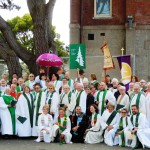ELM History
Our work began when two San Francisco congregations –St. Francis Lutheran Church and First United Lutheran Church– extended calls to openly gay and lesbian pastors, in violation of ELCA policy. These actions led to the 1990 formation of Lutheran Lesbian & Gay Ministries which provided financial support for calls to LGBTQIA+ pastors. In 1993, the Extraordinary Candidacy Project was created to provide a credentialing process for publicly-identified LGBTQIA+ people called to Lutheran ministry.
These groups worked hand in hand until 2007, when the two groups merged to form Extraordinary Lutheran Ministries. The newly formed Extraordinary Lutheran Ministries defined its mission as expanding ministry opportunities for LGBTQIA+ people called to rostered Lutheran ministry by:
- providing a candidacy and credentialing process,
- supporting a collegium of LGBTQIA+ rostered leaders, and
- designating direct grants to ministry by publicly-identified LGBTQIA+ clergy
and rostered lay leaders in the Lutheran church.
ELM 2007 – Present
In its early years, Extraordinary Lutheran Ministries developed momentum largely as a result of the success of the ONE VOICE campaign. This major donor initiative was conducted jointly with movement partners Lutherans Concerned/North America and Wingspan Ministry.
Just prior to the merger, LLGM hired its first fulltime development director, in October of 2006. In January of 2008, that position was redefined as executive director, and the part-time position of operations coordinator was added. That same year the office was relocated from San Francisco to Chicago. With the move, ELM gained a more national presence.
Momentum grew as sentiment shifted within the Evangelical Lutheran Church in America. When ELCA policy change did not happen in 2005, many ELCA congregations decided they were ready to extend calls to LGBTQIA+ pastors, even if it meant risking discipline from the church.
That led to a flurry of extraordinary ordinations. There had been 8 extraordinary ordinations during the 16-year period between 1990 and 2006. There were 10 during the 3-year period of 2006-2009. The ordinations in those three years were geographically diverse, occurring in Minneapolis, Houston, Chicago, St. Paul, San Francisco, Philadelphia and Ontario.
By 2009, the ELM roster had changed from a community of resistance into an active and thriving roster, engaged in a broad range of ministry across the church.
ELM’s predecessor bodies were actively involved in ELCA Churchwide Assembly organizing. In contrast, ELM focused its attention on changing church culture by creating immediate ministry opportunities for publicly-identified LGBTQIA+ rostered leaders. ELM also gave its full support to the efforts led by independent movement partner Lutherans Concerned/North America as they expanded their legislative and ELCA Churchwide Assembly organizing in 2007 and 2009.
Extraordinary Lutheran Ministries determined that its strength was to change church culture through the prophetic acts of extraordinary ordination and calls issued to publicly-identified LGBTQIA+ rostered leaders, relying on authority from the future ELCA policy change anticipated for years.
Following the ELCA policy change, ELM leaders focused energy on implementing it for members of the ELM roster. ELM staff and roster members attended ELCA Conference of Bishops and Church Council meetings. They organized a consultation between ELM roster representatives, ELCA Presiding Bishop Mark Hanson, and other ELCA leaders. This work fostered a new relationship between ELM and the ELCA–and it led to a reception and reinstatement process that took into consideration the unique circumstances of the ELM roster.
ELM Today
Extraordinary Lutheran Ministries affirms and supports LGBTQIA+ Lutheran rostered leaders and those pursuing a call to rostered leadership, while engaging allied congregations and ministries to proclaim God’s love and seek justice for all.
What was once the Extraordinary Roster of 46 has become Proclaim, an active community of over 350+ LGBTQIA+ Lutheran rostered leaders, seminarians, and candidates.
What was once Extraordinary Candidacy has become an active Candidacy Accompaniment program, advocating for and support LGBTQIA+ people in Lutheran candidacy.
What was once Mission Grants has become Ministry Engagement, a way to engage extraordinary congregations celebrating LGBTQIA+-led ministry.
Read more about Lutheran Lesbian & Gay Ministries and The Extraordinary Candidacy Project here
Archives
Below are documents outlining Extraordinary Lutheran Ministries history, and predecessor organizations history:
ELCA Decision regarding St. Francis and First United in San Francisco, 1990
-PDF of the ELCA’s Committee on Discipline decision to suspend both churches from the ELCA. After calling openly gay pastor Jeff Johnson, First United & St. Francis were suspended in 1990, then expelled in 1995. Their actions began the movement that became Lutheran Lesbian & Gay Ministries, then the Extraordinary Candidacy Project and eventually to the formation of Extraordinary Lutheran Ministries.
-Rev. DeLange gave a speech following a tribute to him for his years of service as one of the founders and long time board member of Lutheran Lesbian and Gay Ministries (now Extraordinary Lutheran Ministries). Rev. DeLange gave a speech. Francis Lutheran Church, San Francisco 2006.
Press release on Extraordinary Candidacy Committee
Who is Lutheran Lesbian & Gay Ministries?
Brochure on Extraordinary Candidacy Project- 1999
Ordination Bulletins for those ordained prior to the ELCA vote in 2009
Ordination Bulletin- Jen Rude (Nov 17, 2007)
Ordination Bulletin – Jay Wilson (Dec 6, 2008)
Ordination Bulletin -Lura Groen pt.1 (July 26, 2008)
Ordination Bulletin- Lura Groen pt.2 (July 26, 2008)
Newsletter Archives
Newsletters from 1989:
Newsletters from 1990:
- Newsletter Feb/March 1990
- Voice & Vision Oct 1990
- Voice & Vision Dec 1990
- Voice & Vision Ordination Issue 1990
Newsletters from 1991
- Voice & Vision Jan 1991
- Voice & Vision April 1991
- Voice & Vision June/July 1991
- Voice & Vision Oct 1991
Newsletters from 1992
Newsletters from 1993
Newsletters from 1994

